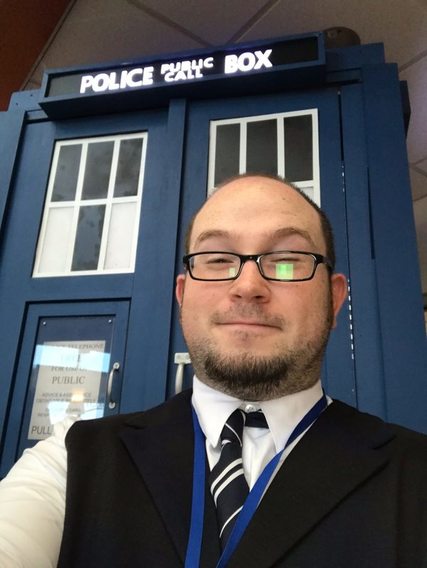 Nick Armstrong is the Geek-in-Chief behind WTF Marketing, dad, author, Ignite, PechaKucha, Startup Week, and TEDx speaker, audio drama enthusiast, and award-winning entrepreneur. More than anything, he loves to make people laugh. He has co-organized community events like Fort Collins Comic Con, Startup Week Fort Collins, TEDxFoCo, Ignite Fort Collins, LaidOffCamp/CareerCamp, PodCamp Fort Collins, and more. Nick’s local efforts landed him a prestigious spot as one of BizWest's 40 Under Forty in 2016 and the Colorado Association of Libraries’ Library Community Partnership Award in 2018. Alongside an amazing team of 13 other super-geeks, he built out Fort Collins Comic Con to benefit the Poudre River Public Library District and has raised over $75,000 for the Library to encourage youth literacy through comics. Nick has written three books: Psychotic Resumes, a Gen-Y resume creation and job search guide, Mess Hunter, a children's book that he also illustrated, and a cookbook called Men in Kitchens: A Good Day to Dine Hard. Nick’s marketing writing has also appeared in anthologies alongside business and marketing greats such as Seth Godin, Ash Ambirge, and Leo Babauta. In general, I knew literally nothing about how to finish most of my writing projects when I started. My first “published” work was a Star Trek audio drama - think old-school radio plays like The Shadow with actors and sound effects and music. I had no idea how to write the audio drama format and even less about how to produce one. Little by little, with lots of help from the online audio drama community, I had my first script, and then a library of sound effects and some music, and a friend who helped connect me to volunteer voice actors. If you’ve never had someone lend a voice to one of your characters, I highly recommend it - it’s one of the most amazing experiences I think any writer can have. Like self-publishing, there are a LOT of things to learn in the production of audio drama - timing, where to place sound effects, how to balance volumes of different clips... the learning curve was extensive, but learning how to stay dedicated to a project over weeks and months was hugely important to my future success in traditional publishing. Around the 2-year-span before and after the height of the Great Recession, I had 12 jobs and was only fired 3 times. My friends were in awe of my ability to land job after job after job with the longest gap being about 3 months (when the average job search length at the time was 12-16 months). All the while, I started my blog Psychotic Resumes about things at each job that were either spectacular or something I wouldn’t inflict on my worst enemy - like the time I was written up for being “overly direct” about a solution that would save the company about $150K in overhead costs. I was sitting on all this excellent content - people continued to comment on my blog even after I’d slowed down regular blogging to focus on starting my own business. In a fit of kismet, one of the graphic designers I regularly worked with asked if I knew anyone who was looking to create a Kindle book. We didn’t have much of an idea of what would be involved, but we dove in and gave it a shot. I’d write, tweak, and modify blogs into chapters and she’d do the design work. A few months later, I had my first published book - Psychotic Resumes. I sold maybe 15 copies total and learned a significant publishing lesson: create in as many different formats as possible. My book was only available in Kindle format, and not many people had a Kindle - especially folks looking for a job. There was no easy or cost-effective way to self-publish (CreateSpace wasn’t widely available yet), and so most people passed on my book. I put most non-blog writing on hold for a while after that. Not that I didn’t want to write, but between a new wife and growing business, there wasn’t time for much else. Adding “new father” to my title didn’t help either until we were about six months into reading piles and piles of children’s books to our son. My wife and I read quite a few beautiful books but just as many head-scratchers (we’re prolific library patrons). It wasn’t until my artist friend created his own CreateSpace children’s book that I realized that I could write a children’s book, too. He was kind enough to help me figure out the basics of the process over the course of a coffee meeting. I wrote out the basic storyline and decided to illustrate it myself. I’d priced out a few graphic designers to help, but the lowest at $700 for 20-ish pages didn’t seem like a wise use of money with a new kiddo in tow. Diapers are expensive, after all! Looking back, I was supremely naive when it comes to how much work this would actually take. I learned basic character design by using Lynda, Skillshare, and 53’s Paper app, but creating every page’s illustration from scratch was hugely time-consuming. This was made worse by the fact that I hadn’t properly confirmed page sizes or minimum page count in CreateSpace before I started illustrating (the technical term for this is “whoops”). After drawing a few more pages and segmenting the story to get to the proper minimum number of pages, I had to learn how to work InDesign - again by using Skillshare and Lynda (surprisingly enough, this was the easiest part of the whole process). A month or so later, I had my proof in-hand. After nearly a whole year of reading other people’s books to my kiddo, I showed him a picture of himself in my book. His giggle when I said, “written and illustrated BY DADDY” was incredibly rewarding. Even better, the skills I learned while digging into Illustrator, InDesign, and CreateSpace allowed me to apply those same skills to help my clients in my day job. Though it took a LOT longer, learning to DIY each part that I could has helped me gain a ton of valuable skills (I even put together my friend’s first book). While the DIY-all-the-things approach isn’t for everybody, for me, it opened up the creative process to so many more applications and reduced costs significantly - allowing me to take more risks on my creative projects. My future projects will involve science fiction - some of my favorite reads are the Magic 2.0 series by Scott Meyer, anything by Becky Chambers, and Year Zero by Rob Reid (who I’ve had the chance to meet and high-five for his fantastic work). Psychotic Resumes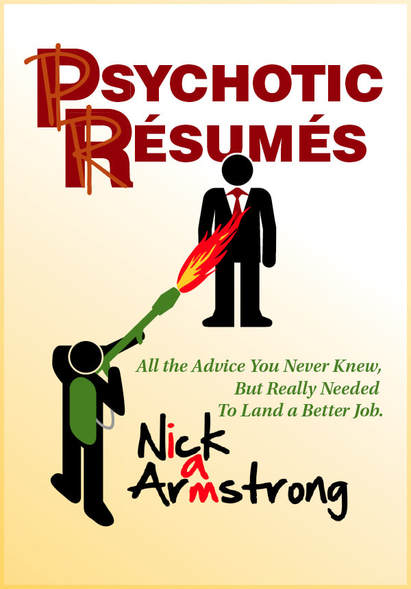 To get the attention necessary to become gainfully employed in a double-dip recession job market with 9%(+!) unemployment, you absolutely have to stick out - in a good way. Honest, risky, and effective, Psychotic Resumes is the kind of advice you won’t find anywhere else. Written by Nick Armstrong, the co-founder of LaidOffCamp Fort Collins and CareerCamp Fort Collins, this isn't your typical "resume" book. Nick's off-the-cuff sense of humor, keen mastery of four letter words, and unique look on today's job market will have you entertained, horrified, and inspired all at once. Do you get the feeling that today's job market rules have changed, but nobody's given you the new playbook? Have you ever seen a job search technique so crazy that you're amazed it worked? Are you frustrated by your seemingly unending job search and willing to try something - anything - to land a job before you resort to a ramen-only diet? Enter Psychotic Resumes: all the advice you never knew, but really needed to land a better job for better pay. You’ll learn how to conduct an effective job search, write better, cleaner resumes, build amazing cover letters, ace your job interviews, negotiate your salary like a rockstar, and organize your business life so you impress on your first week at your new job. Specifically targeted toward Gen-Y (the Millennial Generation), the advice in this book has been field tested for years, proven effective across career paths and geographies to get unemployed college grad butts off mom and dad's couch. Gen-Y doesn't get all the fun, though - Baby Boomers and Gen-X will find a lot of use from the advice in this book, too. It’s time to stop flipping burgers and start doing meaningful work again! Where to Buy Psychotic Resumes
1 Comment
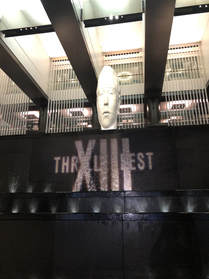 It’s been a week since Thrillerfest 2018 ended and I came back to my home in Boulder, CO, full to the brim with ideas and inspiration. If I had to choose the one thing that I love most about Thrillerfest, it would be the collegial spirit. Thrillerfest is like the coolest writing conference and an awesome Con mixed together, featuring some of the top names in the genre who enthusiastically shower us with their knowledge and experience. Very few places give me the chance to me a serious writer and a serious fan-girl all in one place. It’s magic. Some highlights then… 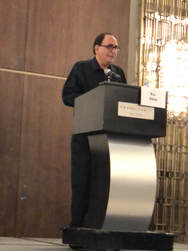 R.L. Stine @ #Thrillerfest18 R.L. Stine @ #Thrillerfest18 On the first day of Craftfest, R.L. Stine gave a talk called “All My Writing Secrets Revealed” so….I mean, obviously I had to go, yes? I write for adults, but I mean, come on. It’s R.L. Stine! I grew up alternating between Stine and Christopher Pike (who played an important, if indirect, role in Stine’s move from humor to horror). Now, my kids read Goosebumps. R.L. Stine is a delightful person. The talk he gave was bursting with the joy of writing and it was contagious. I can’t imagine anyone sitting in that audience without wanting to get back to the keyboard. Later, he signed some copies of his latest Goosebumpsbooks for my kids. My son was amazed that his name was spelled right without me having to help J I also enjoyed two very different presentations by two very awesome Megs. Last year, when I was reading Megan Abbott’s book You Will Know Me, my daughter was in gymnastics and it actually gave me nightmares. Megan is a sweet, funny, and enthusiastic presenter. She gave some wonderful examples about setting the mood when writing thrillers and I’ve already started applying those lessons to my manuscript. Then, there’s Meg Gardiner, whose class on creating suspense was full of valuable takeaways. These women are charming, articulate, and interesting, making for a very happy me. 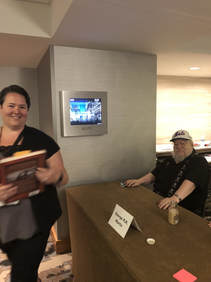 Me and George R. R. Martin @ #Thrillerfest18 Me and George R. R. Martin @ #Thrillerfest18 Oh, and Megan Miranda made my day! We met last year, and when I asked her to sign my book this year, she remembered me J(yep, fan-girl). Her new book Fragments of the Lostlooks amazing! I love meeting authors I’ve been reading for years, and also being introduced to new authors who I’ll be reading for years to come. In a panel on creating suspense, Gin Phillips talked about motherhood and how some of the routine things we do create the perfect atmosphere for suspense—in her case, going to the zoo. Can’t wait to open up Fierce Kingdom. And who can forget the moment when the lights when off on George R. R. Martin? I’ve been hoping to meet that guy for almost a decade, and it was thrilling to do so. We chatted about New Mexico (where he lives and where I’m from). I love how genuine and accessible even the biggest stars of the conference are—its always a pleasure meeting them and they always make you feel like you belong. 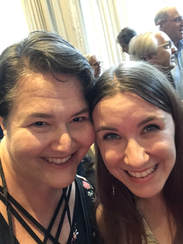 Me and Chloe Hawker Me and Chloe Hawker I got to hang out with old friends like Chloe Hawker, make new friends like TJ Turner, and met long-distance friends like Joe Clifford in person. I left the Big Apple with some amazing opportunities and some wonderful memories. Can’t wait until next year! For the second year, my cousin Rachel joined me in NYC. We went to see the fashion exhibit at The Met, and took a tour of the Senses exhibit at the Natural History Museum. We rode the subway around town, walked Central Park and enjoyed delicious food and stunning views at Print (if you haven’t been, check out the rooftop bar). Rachel is one of my very favorite travel partners. She introduces me to high fashion and I regale her with stories of murder and mayhem. It’s a fair trade.
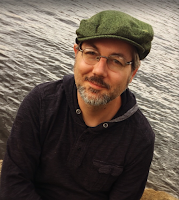 David Sharp is a noisy librarian. He has written three plays which have been produced six time altogether. He is a regular contributor to The Writing Bug, and he has written a novel for which he is seeking representation as well as numerous short works. Lost on a PageLife can be hard on a writing schedule. I was in the middle of an unplanned move. My split-level apartment had become flooded during a sudden afternoon deluge. The result wasn't pretty, and it ended with my landlord and I renegotiating my move-out date. My car had only two working doors, and the money I'd been saving to replace it was now going toward a new place to live. I'd been transferring boxes to the new place and pining for a truck with a trailer. I needed to take a break. So, I stopped into a nearby coffee shop. I was basked in the cool air conditioning and tried to forget I still had a full afternoon of heavy-lifting ahead of me. My phone pinged. An email. From a publisher. They wanted to "offer me a contract" for the manuscript I had submitted to them. Confused, I reread the email several times. This was a foreign sort of missive for me. It resembled a rejection. Now those I had experience with. Polite opening. Formal language. It thanked me for my submission. But instead of telling me the piece was not right for them at this time and wishing me luck with my future endeavors, it seemed to be saying they'd like to publish my novel. If this were a fictional story, this is the part where the writer would begin shouting for joy, his present hardships forgotten, and making such a scene that all the coffee shop patrons would stare at him like he'd lost his mind. That's not how it really happened, though. My emotions were already so strained working through my current struggles (of which the move was only the latest development) that they just couldn't seem to fathom what was happening. I felt like I had blown a fuse. Unwilling to trust my own comprehension, I did what any self-respecting writer would do. I forwarded the email to my critique group and asked them to tell me what they thought it meant. Was this a different language or something? Perhaps the word "contract" in this email was the publisher's polite way of telling me I had come down with malaria. Because, of course they couldn't mean the kind you sign. The truth is, you develop such a thick skin for rejections in this business it takes a while for elation to sink through it. (It did eventually, though. And I had a nice, dry apartment to celebrate in.) None of this is how I'd imagined the fateful day I'd finally hook a publisher. The dream I constructed in my head had nothing to do with heavy boxes, flooded carpets or a car on its last tires. But I shouldn't have been surprised. None of the other steps in this journey happened the way I pictured them either. And lucky for me, they didn't. My writing journey didn't happen in a vacuum. It was interwoven with life events and all their ups and downs. It was informed by them. I'm a single parent of two children, one of whom has some special considerations. I'm a full-time librarian. It's a lot more work than you might imagine. (And no. I don't get to read books all day.) I complain from time to time that it is difficult to find time to write. It is! By the time I make dinner, help with homework, spend time being a parent and put the kids to bed, the last thing I want to do is boot my computer up. But I've come to learn that only the last part of writing involves putting words on the page. It's all that other madness that gives me words to begin with It's all writing. I can now hold my own bound book in my hands. It has accrued several stars on Amazon. And now that I've "arrived" (whatever that means) my journey contains as many twists and turns as it ever has. Life hasn't let up since my book published in May, and I suppose that's a good thing. I have a sequel to write after all. It's tricky to find a spare moment sometimes, but I'm never short on inspiration! In fact, I should probably cut this short, because I hear my children producing some inspiration right now. And by the sound of it, this is going to be on the epiphany level. The last time involved an intricate contraption of Lego blocks and duct tape and they... Well, another time! It'll be a chapter somewhere; just watch for it 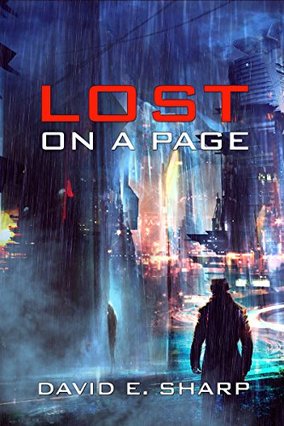 Joe Slade is a detective with a hot lead and a warm gun. He no longer believes in happy-ever-afters, but the jury's still out on plot twists. Good thing. He's about to discover the mother of all twists that will cure his doldrums like pliers to a toothache: Joe Slade is not real. He's the protagonist of a series of hardboiled mysteries. And when Joe finds out that all his strife has been in the name of boosting book sales, there will be hell to pay. Vowing revenge on his author, he will band with the mysterious Ellodrine, a high fantasy wizard who suffers from reinterpretation. Together, they will set off for the World Where the Books Are Written. But the road will take them through new books with genres strange and foreign; epic fantasy, bodice-ripping romance, intergalactic sci-fi, and others even more dark and horrible. But what if this new life is about more than just living? And will Joe still come out on top when all the rules have changed? Where to Buy Lost on a Page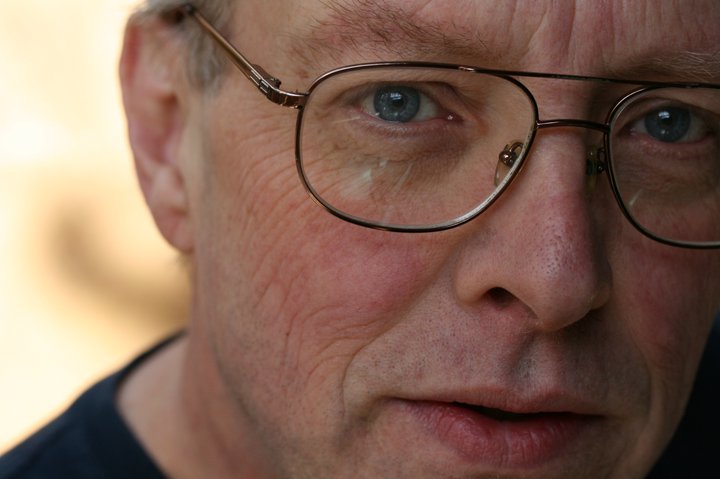 Brian Kaufman is curriculum editor for an online junior college. He has published four novels, two textbooks and a number of novellas. In other universes, he is a pro wrestler, a radio talk show host and a heavy metal guitarist. In this universe, he lives with his wife and dog in the Colorado mountains, avoiding moderation and any pretense of maturity. My love of books grew out of weekly trips to the library with my father. The local library proved to be too small, so every Monday night, we made the hour drive to the Cleveland Public Library, a huge old building with multiple floors and wings. There, I found vast, unattended areas stuffed full of books written by dead people. Quiet, shadowy aisles full of Poe, Lovecraft and Shelly made me a lifetime fan of dark fiction. When people talk about the feel and smell of a real book, I think of that library and the odors of leather, mildew and dust. And I think of the quiet. My goal was to read seven books a week. I kept pace for years, until baseball practice began cutting into reading time. (Dad helped with baseball, too. We played catch after dinner every night, weather be damned. I didn’t learn how little he cared for the sport until years later.) Baseball aside, I don’t think I’ve ever gone a week without reading at least one book. Back then, I read everything. I gravitated toward age-inappropriate material. My father borrowed our books on his library card, so he knew what I was reading. Much to my relief, he never commented on my choices beyond suggesting additional titles. When I was twelve, I announced my intention to earn my living in professional sports. My father suggested that I might need a backup plan, so I began writing. If not center fielder for the Yankees, then a best-selling author, right? Later, when I married and the need for a backup plan became more immediate, he explained that writing for a living was like “winning the lottery.” He suggested ways to pursue a dream in my spare time, beginning with the need to make spare time available. I had a craft to learn, and a million words to write. Through the administrations of eleven different Presidents, I’ve learned a few things more:
This last piece of advice informed my most recent efforts. My parents suffered eventual health setbacks that convinced me of my own mortality. Mom passed last year, and Dad followed her shortly thereafter. Having carried some “bucket list books” in the back of my head for decades, I decided to tackle the stories I’d always meant to tell, but somehow put off. I started with The Fat Lady’s Low, Sad Song--a tale about baseball, the passion for a fading dream, and saying goodbye to the people and things you love. The Fat Lady's Low, Sad Song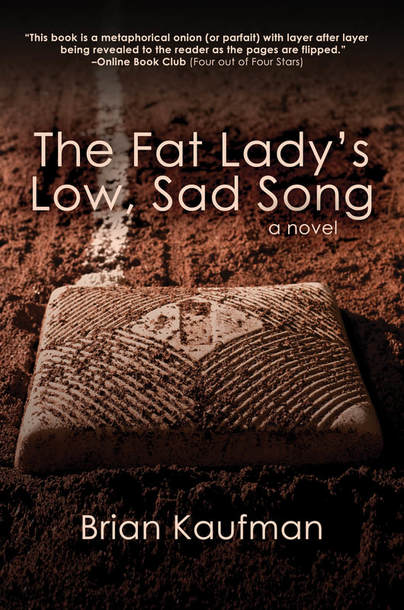 Courtney Morgan is a female knuckle-ball pitcher trying to break into professional baseball. Parker Westfall is an aging slugger with one last chance at the ultimate carrot—a spot on a major-league roster. She’s gorgeous, and he’s having the season of his life. Together, they’ll try to change a losing team’s fortunes on their way to the big show. But when tragedy strikes, will their dreams still matter? The Fat Lady’s Low, Sad Song is about what it means to be part of a team, and part of a community in the heartbreaking world of minor league ball. "An entertaining, sweetly atmospheric baseball story." ~Kirkus Reviews Like Brian's page on Facebook Follow Brian on Amazon Check out Brian's blog Follow Brian on Goodreads Where to Buy The Fat Lady's Low, Sad Song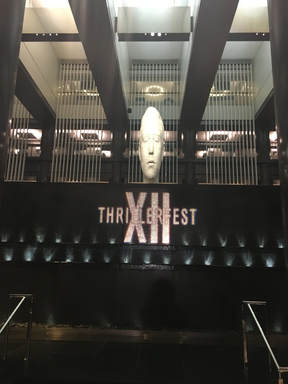 The entrance at the Grand Hyatt for Thrillerfest 2017 The entrance at the Grand Hyatt for Thrillerfest 2017 About a week before conference time, I start getting a little bit nostalgic. During NCW, I spent hours reminiscing over previous years programs and all the shenanigans I enjoyed. Now it’s time for Thrillerfest and I’m strolling down memory lane. This is my second year. When I decided to change direction with my writing, I started looking for craft and community opportunities. I ran across the International Thriller Writers Organization and, as a result, got introduced to Thrillerfest. The organization was founded by some of my favorite thriller authors…names you see on the best seller shelves at every bookstore you visit. And the prospect of being in the same room with some of those people was daunting to say the least. I’d finished my first thriller manuscript, but I wasn’t ready to pitch yet. What I knew though, without a doubt, was that I needed to be with people doing the same thing I was doing. Now, I’m not going to lie. I am a completely over-the-top fan girl when it comes to authors. As a library volunteer in New Mexico, some of my best memories include authors like Michael McGarrity, Denise Chavez and Hampton Sides. I’d discovered that George R. R. Martin lived in Santa Fe and I was scheming on ways to entice him down to my hometown when Game of Thrones hit HBO and I figured I’d lost my chance to meet him (keep that in mind, it becomes relevant in a few paragraphs). Last year at Thrillerfest, Lisa Gardner (who is one of my very very very favorite thriller authors) was receiving the Silver Bullet award and, at one point, being interviewed by Karin Slaughter (another favorite). I nearly died of a heart attack before I even got there! No chance of keeping my cool. As a thriller fan, meeting Gardner and Slaughter, as well as Lee Child, David Morrell, Lisa Jackson, R.L. Stine, Megan Miranda, Shari Lapena and so many others was magic! I adore New York City. As a visually impaired person, big cities offer freedom that you just can’t find in small town America. Arriving at the hotel, I settled in and tried to put on my game face. I’d volunteered to room monitor for a few sessions as a way of getting past my nerves. That’s how I met Sam Wiebe, who I’ve since come to adore and admire greatly. I took in a zillion pieces of new information (as you do at conferences) and met a lot of really great people. What was most amazing to me was how accessible the stars of the thriller genre are. I had casual conversations with people I’ve been reading for years (in some cases, decades). It’s hard to put to words how important that experience was for me. So, I’ll be heading back to NYC again next week for Thrillerfest 2018! Woo hoo! And guess who this year’s Thrillermaster is? George R. R. Martin!!! A decade later, I’m going to get to meet another prolific author who I’ve read and loved and admired. So exciting! And I’m looking forward to connecting with the people I met last year, and writers I’ve had the honor to get to know online in the meantime. Who’s joining me? Here are some pics from last year's conference and some sight-seeing with my cousin Rachel. We saw three shows during our stay. Waitress was definitely the best! 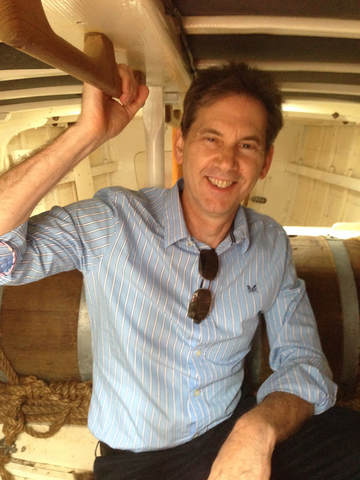 Brad Borkan has a graduate degree in Decision Sciences from the University of Pennsylvania and has a fascination in how people and businesses can make better decisions. He is based in London and was recently made a Fellow of the Royal Geographical Society. Antarctica – the early 1900’s – life and death decisions Americans vividly remember where they were when 9/11 happened or, if older, when JFK was shot. I remember those events too. Another significant event I remember is where I was when I picked up my first book about the early Antarctic explorers. My mother volunteered part-time at the local public library, and at the age of 8, I would have to go there after school. It was quite boring until, by chance, I picked up a book about Captain Scott’s expeditions to the South Pole. I was hooked. Brave people doing dangerous things in the most inhospitable place on earth -- exciting stuff for an 8 yr old! Over the years I read a few more books about these explorers, expeditions to other cold regions as well as books about mountain climbers. Cold, ice, snow, danger and mountains intrigued me. Early in my working life, I had the lucky experience to move to England for my job in software. I vaguely knew there were some Antarctic societies in the UK, but didn’t really pursue them until I discovered there was going to be a 100th anniversary conference commemorating Captain Scott in 2011. During the 3 hour train journey from London to Plymouth I was thinking this might be the dumbest thing I had ever done. Through a stroke of luck I shared a taxi from the Plymouth train station to the hotel with two Antarctic experts who kindly introduced me to many people – descendants of the early explorers, historians, authors of books I adored, Antarctic experts, and modern-day explorers. All were incredibly friendly and welcoming. Over the years I attended more Antarctic events and conferences and realized something is missing. There are lots of biographies of the great explorers like Scott, Shackleton, Amundsen and Mawson, and lots of accounts of their expeditions, but no one had looked across the 6 major expeditions made in the early 1900’s using the framework of the life-and-death decisions. I thought about this for several years, and decided what was possible was not just a book retelling these incredible stories, but one that could actually put the reader into their situations, and encourage the reader to think what they would have done. (e.g. would you leave a colleague dying of scurvy alone on the ice to save yourself, even if he asked you to). Also, I realized there are many great lessons to be learned from the early explorers that can help us today in our modern lives. We all hit patches of adversity, challenges and bad luck – the early explorers did too, and for the most part they survived. These lessons could help people today. I had one other goal – the book had to be intelligent like a Malcolm Gladwell book, fast reading like a Dan Brown or John Grisham, and helpful like a Tony Robbins book. It also needed to be historically accurate. I knew I could not achieve this without a co-author who was both an experienced author and an Antarctic expert. Fortunately I met David Hirzel at an Antarctic conference in May 2015, and despite living 8 time zones apart, our collaboration began. Fast forward to today. Two years in the making, the book I co-authored has surfaced. It is called When Your Life Depends on It: Extreme Decision Making Lessons from the Antarctic. The book was vetted for historical accuracy by seven of the world’s leading Antarctic historians (many of whom I met at the Captain Scott conference in Plymouth years before), and the cover was designed my one of London’s leading book designers. The book has been endorsed by Sir Ranulph Fiennes, the greatest modern Polar explorer of our lifetime. Jonathan Shackleton, a descendant of the explorer Ernest Shackleton has called it, “the Polar book of the year”. I still live in England and work for a software company full-time. Writing the book has changed my life -- I now do book talks to business and non-business audiences and have appeared on cable TV and internet radio. My goal has always been to get the Antarctic stories into the common culture, and to hopefully show people that they can overcome challenges, adversity and bad luck just like the early explorers did. Our website is www.extreme-decisions.com, and I am occasionally on twitter as @PolarDecisions. Our audiobook came out this month and was recorded by a world-renowned narrator, Dennis Kleinman. Dennis was so taken by the stories in the book that he made a 3 min video to help promote it. The book was joy to write, and from it my co-author and I have developed a life-long friendship with the hope of collaborating on another book. When Your Life Depends on It: Extreme Decision Making Lessons from the Antarctic 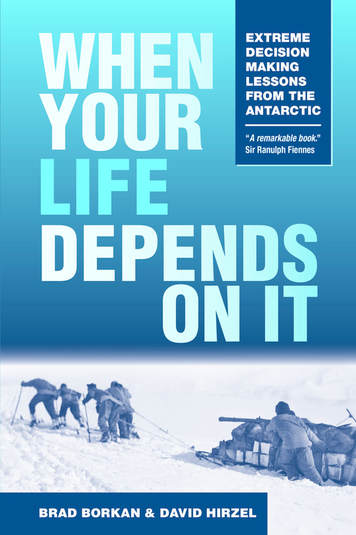 Antarctica -- Life-and-death decisions -- the early 1900's. The only communication is as far as you can shout. How Scott, Shackleton, Amundsen and Mawson risked it all in their quest for the South Pole and beyond, and what we can learn from their situations to improve our modern-day decision making. Grab a warm blanket. This book puts you right into the action of the life-and-death decisions made by early Antarctic explorers. It is filled with unforgettable stories about the challenges and decisions they faced on the ice. While we might not be pulling sledges across Antarctica in the early 1900s, this book also reveals valuable lessons in leadership, team work, and sheer grit and determination that can help all of us make better decisions in our lives today. In When Your Life Depends on It, you'll discover:
Co-written by a decision scientist and an Antarctic historian, When Your Life Depends on It is filled with tales of resilience that resonate with people who love travel and adventure as well as those seeking insights into human behavior. It reveals the mind-set of the brave men who risked, and in some cases gave their lives, for science, discovery and exploration. Buy When Your Life Depends on It today to learn about one of the most remarkable periods of history and in the process learn new strategies to improve your own personal and business decision making. Find Brad's website here Find the 3 minute book trailer here Find Brad on Twitter here Where to Buy When Your Life Depends on It: Extreme Decision Making Lessons from the Antarctic |
AuthorI'm generally pulled in a million different directions and I wouldn't trade it for the world. Here's a glimpse of my life - hope you enjoy it! And if there's a big lapse between posts, well, that's the way life goes in Amy's world. Archives
October 2022
Categories
All
|
|
Copyright 2024 by Amy Rivers. All rights reserved. |
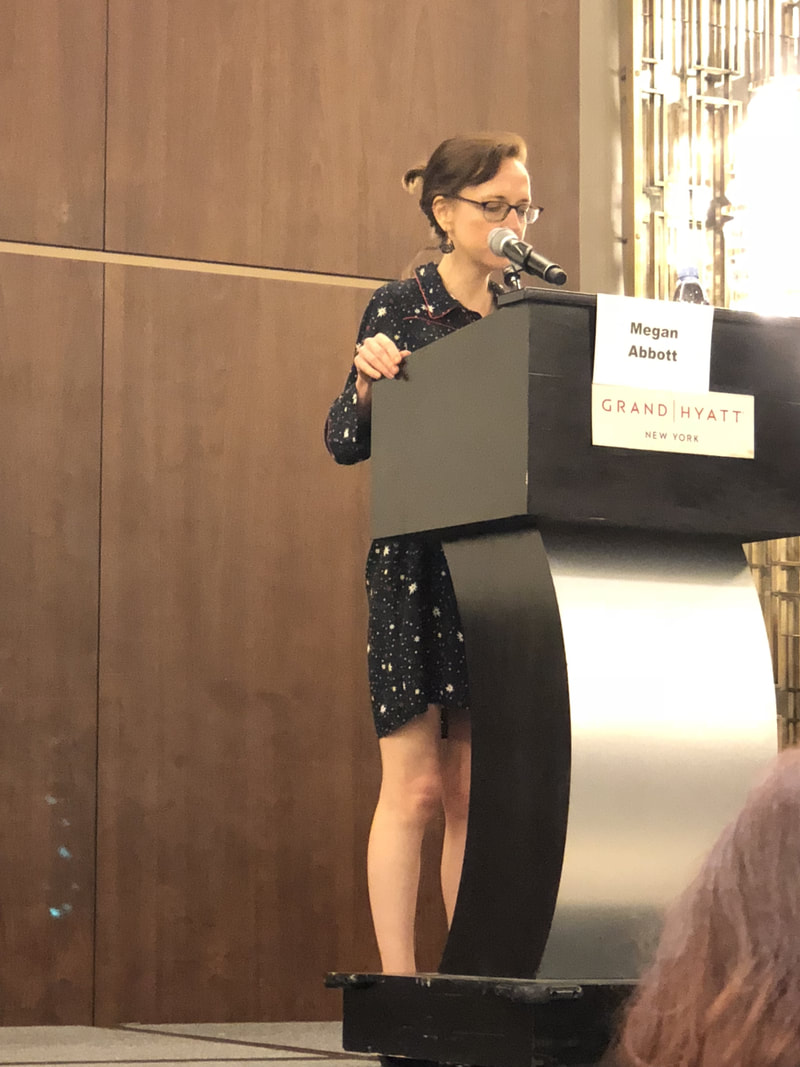
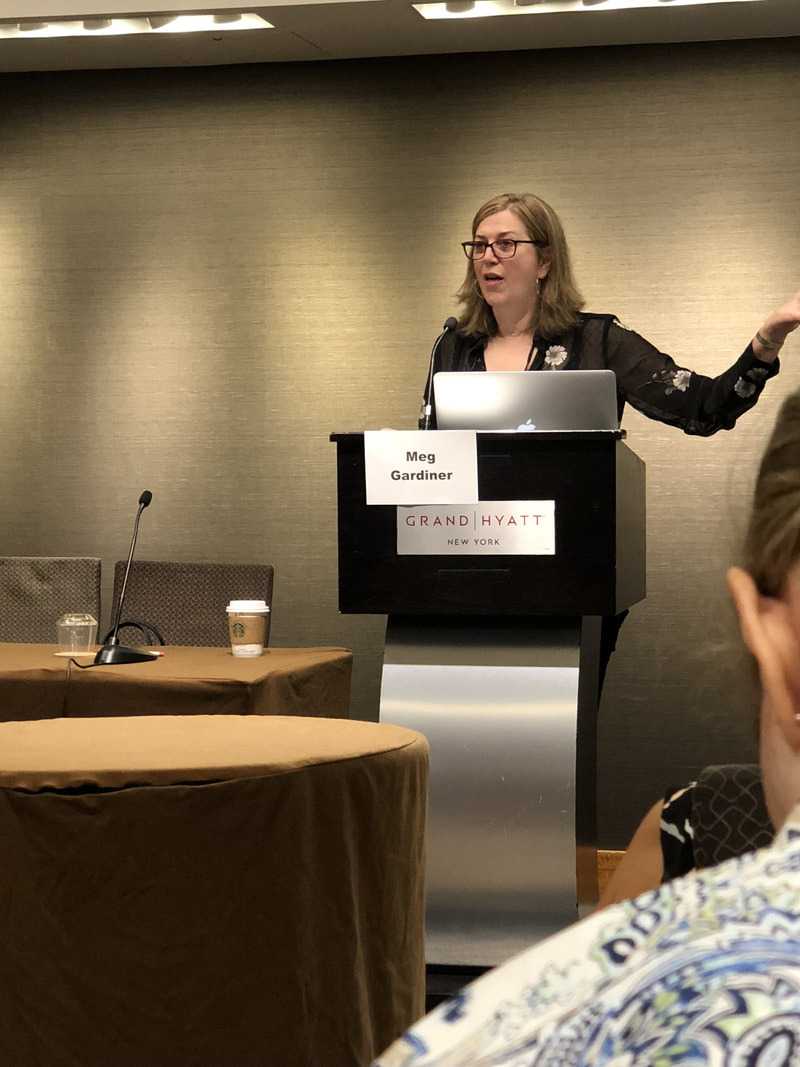
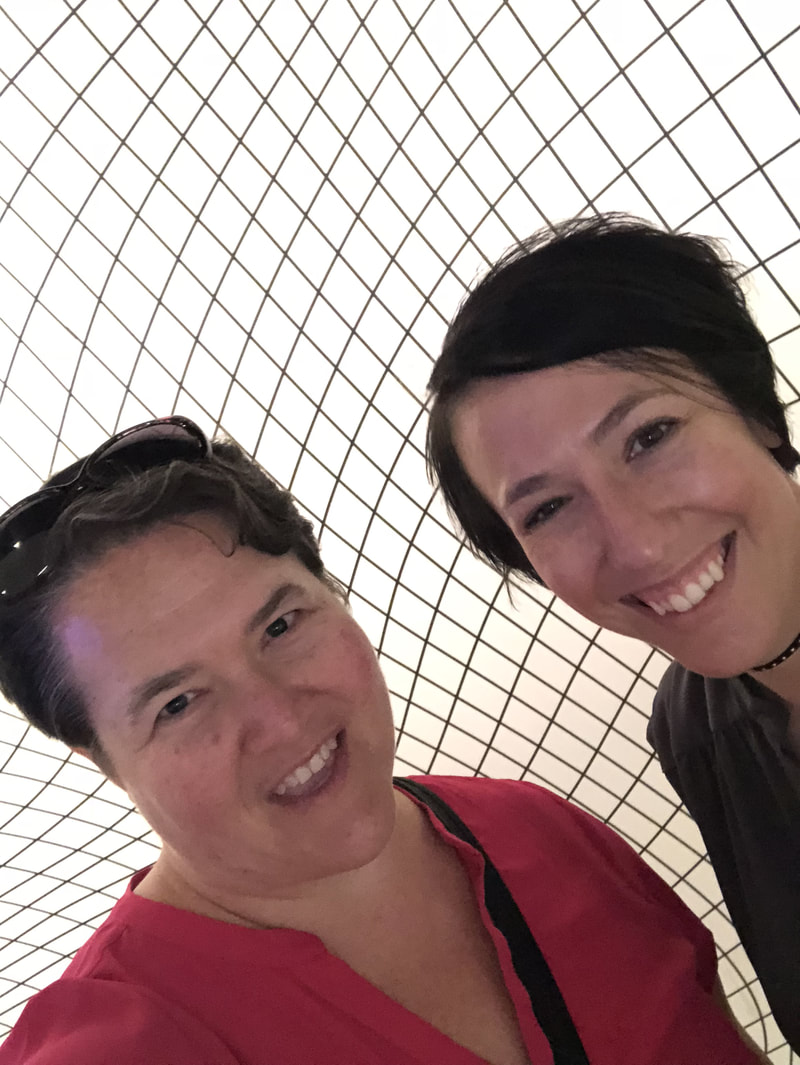
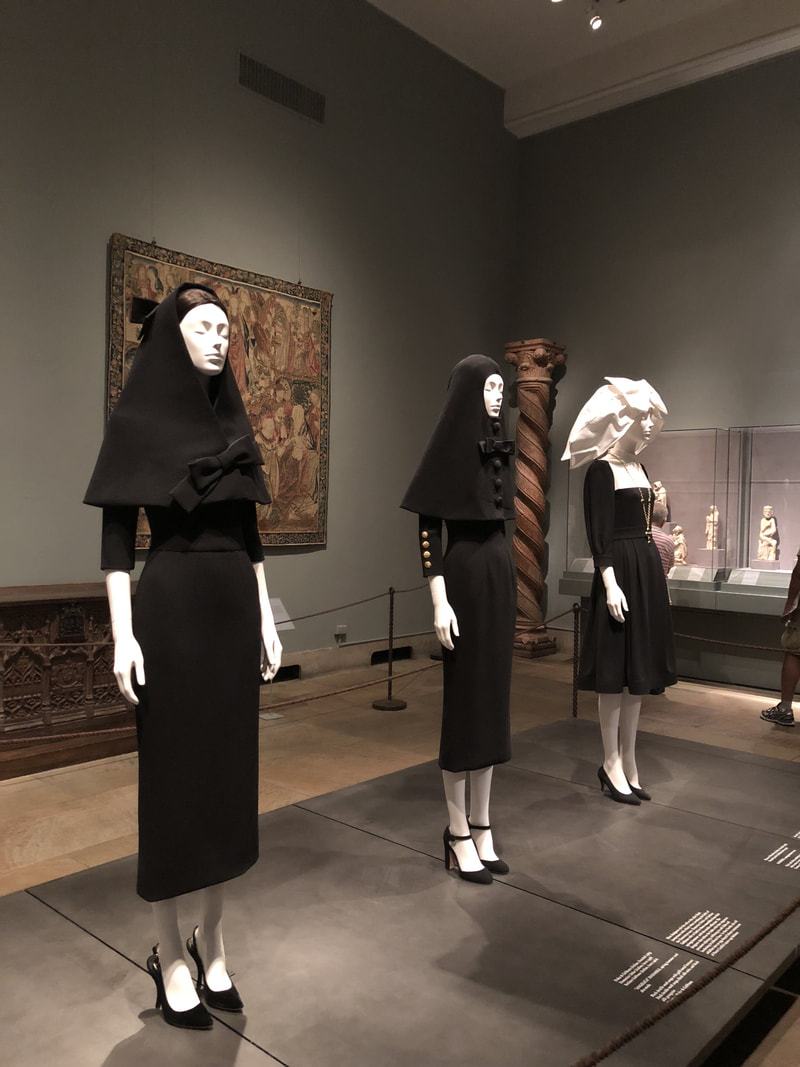
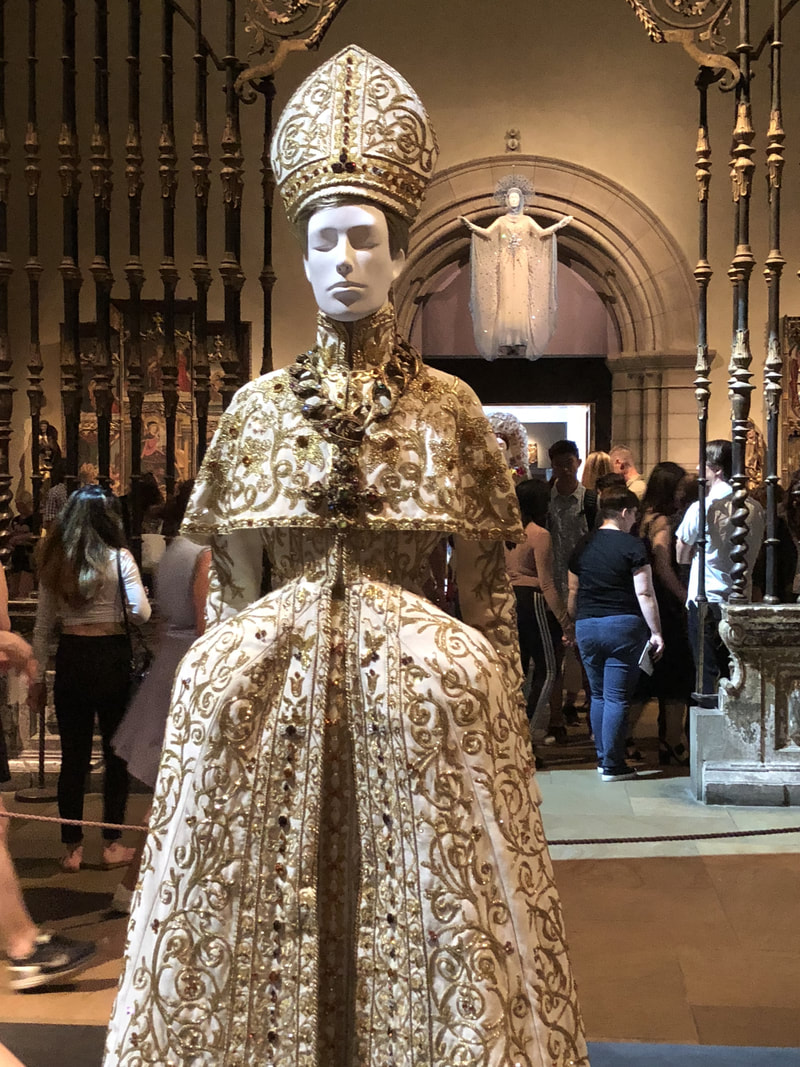
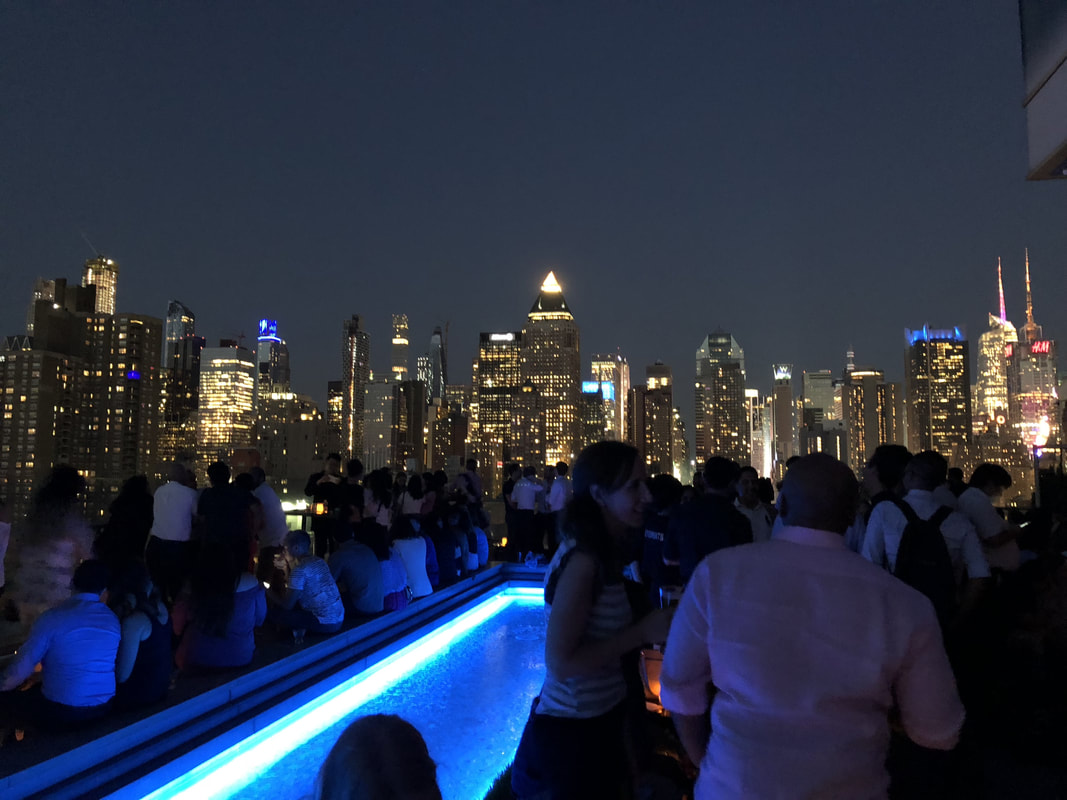
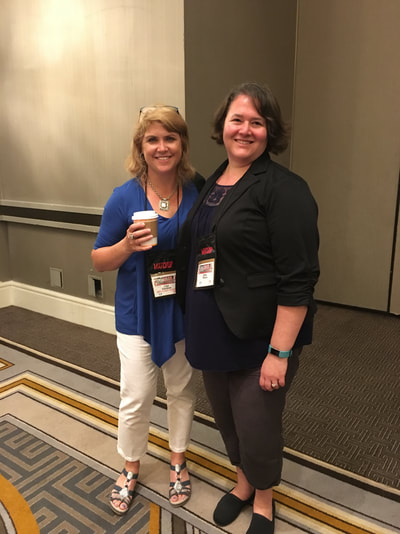
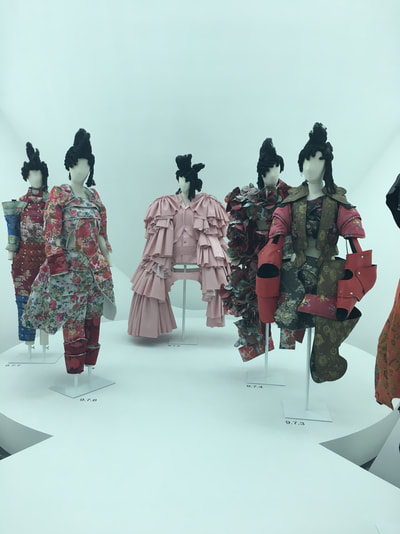
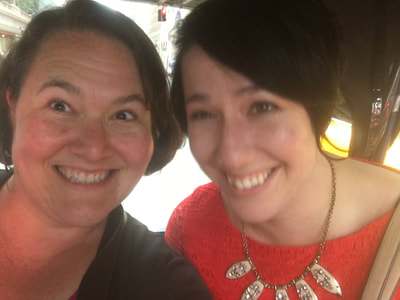
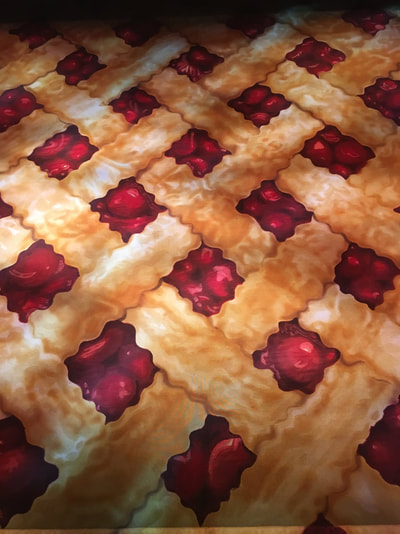
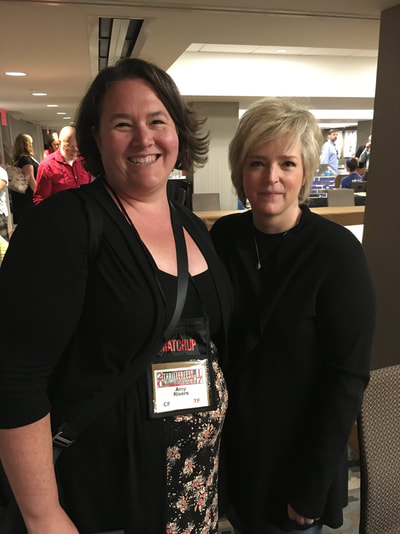
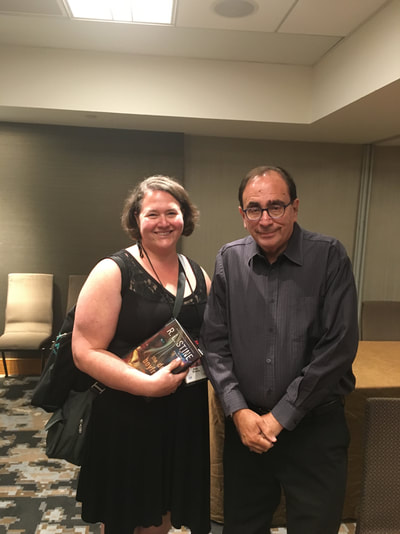
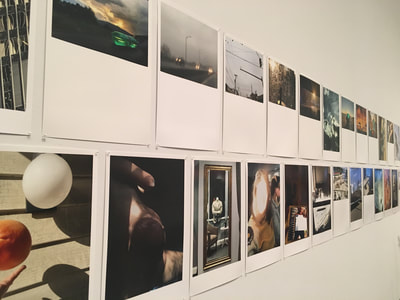
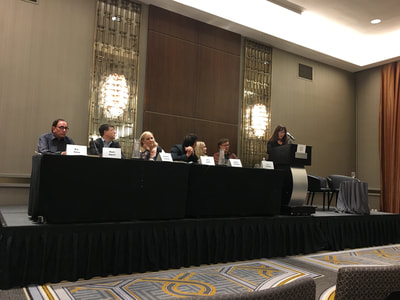
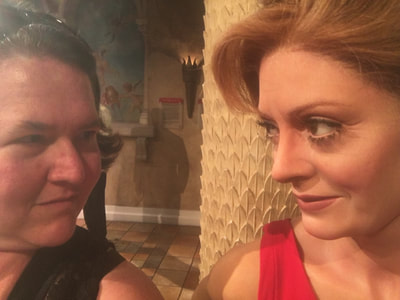
 RSS Feed
RSS Feed